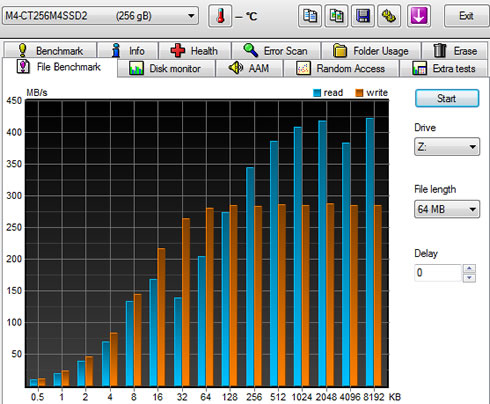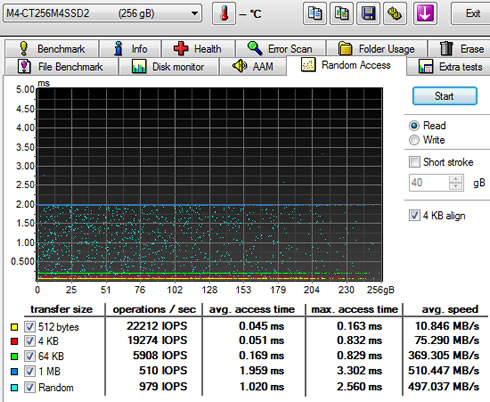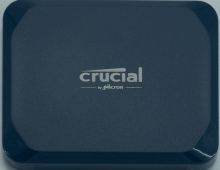Crucial m4 256GB SSD Review
3. Benchmarks - page 1
Review Pages
Here is our testbed:
- Motherboard: Foxconn Quantum Force Rattler P67 vP04 BIOS
- Processor: Intel Core i5-2500K
- Case: Open Air testbed
- Power Supply Unit: Club 3D CSP-X1000CB 1000 Watt
- Graphics card: Club3D Radeon HD 6790 CoolStream Edition
- Memory: OCZ Gold PC3-10600 4x2GB 1333@CL9
- HDD: WD 500GB 7200RPM
- Monitor: LG L246WH-BH 24"
- Windows 7 x64 SP1 with latest updates installed
For the tests, we used the following software:
- HDTachRW v3.0.1.0
- HD Tune v4.50 Pro
- Crystal DiskMark v3
- ATTO Disk Benchmark v2.46
- ASS SSD Benchmark 1.5xxx
- IOMeter v2006.07.27 with Xtreme Benchmark template
- PCMark Professional edition v1.04
- AIDA64 Disk Benchmark Extreme Edition
We start the tests with the HDTachRW software. HD Tach is a low level hardware benchmark for random access read/write storage devices. The software measures the sequential read speed (at various points on the device), the random access speed and sequential write speed.
The software reported an average sequential writing speed of 288.0MB/s and a sequential reading of 391.7 MB/s.

These figures are not exactly those quoted by Crucial but still, it is a good performance.This is not the first time we see an SSD performing lower than expected in this benchmark. That's mainly due to the fact that the HD Tach sequential read test is different from other benchmarks. Most benchmarks create a file on the drive and test within that file. But the latest drives use a zone bit recording technique that allows different read speeds depending on where the data is located. This means that data on the outside of the drive is much faster than data recorded on the inside.
We move on to the HD Tune Pro software, another utility we used to measure the drive's reading performance. Although not necessarily representative of real-world workloads, HD Tune's targeted tests give us a glimpse of each drive's raw capabilities. In the a sequential read test, the drive read the data at 189MB/s (average). The reported access time was 0.175 ms:

In the corresponding writing test, the drive wrote the data sequentially on the disc at 222.6 MB/s. As you see in the screenshot below, the drive's writing speed was not stable after the 128GB mark:

Here is another sequential file test. The software used 64MB of data comprising out of sizes ranging from 0,5 KB to 8 MB. As you see in the benchmark below, the drive was faster once it passed the 128KB file size.
The SSD's performance for write topped at around 275MB/s and for read close to 425MB/s. Both results are very slightly higher than the performance figures quoted by Crucial:


The HD Tune Pro also allows random read testing. Here are some more results with the software to randomly seeks files of different sizes:

Review Pages





















